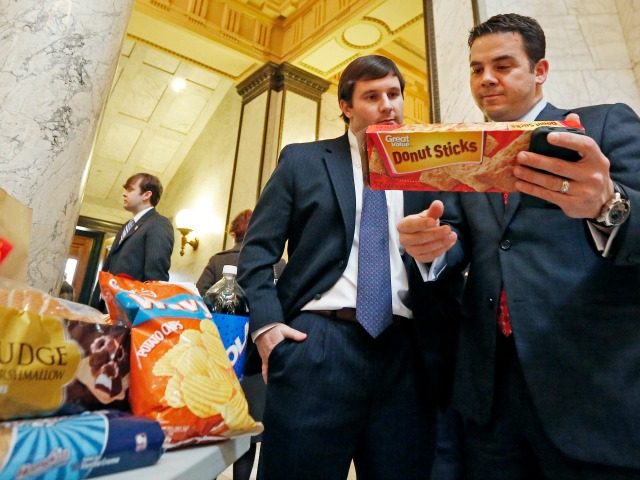Americans use food stamps to buy more than $600 million worth of “sweetened beverages,” and bought hundreds of millions more of junk food and sugary snacks, according to a report published by the United States Department of Agriculture (USDA).
Overall, food stamps worth nearly $1.3 billion were spent on “sweetened drinks, desserts, salty snacks, candy, and sugar,” which accounted for about 20 cents of every dollar spent on food items purchased by 26.5 million households in 2011, said the report.
The USDA administers the $74 billion food stamp program, also known as SNAP or the Supplemental Nutritional Assistance Program.
The report compared spending patterns between SNAP and non-SNAP households and found that “sweetened beverages,” which includes fruit juices, energy drinks, and sweetened teas, accounted for nearly 10 percent of the total amount of money spent on food.
“In this sense, SNAP is a multibillion-dollar taxpayer subsidy of the soda industry,” Marion Nestle, a professor of nutrition, food studies and public health at New York University told the New York Times. “It’s pretty shocking.”
Overall, SNAP users spent 22.8 percent of their benefit on sugary drinks, desserts, salty snacks, candy, sugar, plus jams and sweets, and only 11.9 percent on fruits and vegetables. Families that don’t use the SNAP program spent 20 percent of their funds on those sweet items, and 16.3 percent on fruits and vegetables.
The multi-billion dollar, taxpayer funded food stamps program has become increasingly controversial thanks, in part, to its massive growth under President Obama.
More than 10.7 million more Americans — a 32 percent jump — have become reliant on food stamps to feed themselves since Obama took office in 2009, according to data released by the Department of Agriculture (USDA).
And in that time, countless studies have been published and health experts have warned that restrictions are needed to curtail food stamp use to purchase unhealthy foods. Government watchdog groups have also called for tighter regulations as food stamp fraud remains a common and costly problem.
Food stamps have also become a major moneymaking market for some of America’s biggest banks.
Hundreds of millions of dollars have been made by a handful of banks that help the U.S. government process payments to food stamps recipients.
“Three companies – J.P. Morgan EFS, Affiliated Computer Services, and eFunds – provide EBT services for 49 states and 3 US territories,” an investigation by the Government Accountability Institute (GAI) found.
“Since 2004, 18 of 24 states who contract with J.P. Morgan to provide welfare benefits have contracted to pay $560,492,596.02,” the GAI investigation revealed. “New York alone has a seven-year contract worth $126,394,917.”
Profiting from poverty was apparently an “important business” for JP Morgan.
“This business is a very important business to JP Morgan,” Christopher Paton, the company’s former managing director of treasury services, told Bloomberg News in 2011. “It’s an important business in terms of its size and scale. We also regard it as very important in the sense that we are delivering a very useful social function. We are a key part of this benefit delivery mechanism. Right now volumes have gone through the roof in the past couple of years or so … The good news from JP Morgan’s perspective is the infrastructure that we built has been able to cope with that increase in volume.”
The president-elect has indicated that he wants to make cuts to various welfare programs and the Republican platform promises to separate the food stamps program from the Farm Bill, where SNAP funding is currently derived.
Follow Jerome Hudson on Twitter @jeromeehudson

COMMENTS
Please let us know if you're having issues with commenting.